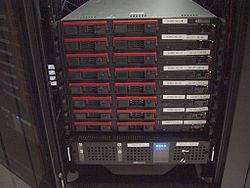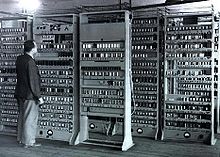- Computing
-
For the formal concept of computation, see computation. For the magazine, see Computing (magazine). For the scientific journal, see Computing (journal).
Computing is usually defined as the activity of using and improving computer hardware and software. It is the computer-specific part of information technology. Computer science (or computing science) is the study and the science of the theoretical foundations of information and computation and their implementation and application in computer systems.
Computing Curricula 2005[1] defined "computing" as:
"In a general way, we can define computing to mean any goal-oriented activity requiring, benefiting from, or creating computers. Thus, computing includes designing and building hardware and software systems for a wide range of purposes; processing, structuring, and managing various kinds of information; doing scientific studies using computers; making computer systems behave intelligently; creating and using communications and entertainment media; finding and gathering information relevant to any particular purpose, and so on. The list is virtually endless, and the possibilities are vast."
A computer is a machine that manipulates data according to a set of instructions called a computer program. The program has an executable form that the computer can use directly to execute the instructions. The same program in its human-readable source code form, enables a programmer to study and develop the algorithm. Because the instructions can be carried out in different types of computers, a single set of source instructions converts to machine instructions according to the central processing unit type.
The execution process carries out the instructions in a computer program. Instructions express the computations performed by the computer. They trigger sequences of simple actions on the executing machine. Those actions produce effects according to the semantics of the instructions.
Computer programming in general is the process of writing, testing, debugging, and maintaining the source code and documentation of computer programs. This source code is written in a programming language, which is an artificial language often more restrictive or demanding than natural languages, but easily translated by the computer. The purpose of programming is to invoke the desired behaviour (customization) from the machine. The process of writing high quality source code requires knowledge of both the application's domain and the computer science domain. The highest-quality software is thus developed by a team of various domain experts, each person a specialist in some area of development. But the term programmer may apply to a range of program quality, from hacker to open source contributor to professional. And a single programmer could do most or all of the computer programming needed to generate the proof of concept to launch a new "killer" application.
Contents
Definitions
The term "computing" has sometimes been narrowly defined, as in a 1989 ACM report on Computing as a Discipline[2]:
The discipline of computing is the systematic study of algorithmic processes that describe and transform information: their theory, analysis, design, efficiency, implementation, and application. The fundamental question underlying all computing is "What can be (efficiently) automated?"
Computing Curricula 2005[1] also recognizes that the meaning of "computing" depends on the context:
Computing also has other meanings that are more specific, based on the context in which the term is used. For example, an information systems specialist will view computing somewhat differently from a software engineer. Regardless of the context, doing computing well can be complicated and difficult. Because society needs people to do computing well, we must think of computing not only as a profession but also as a discipline.
The term "computing" is also synonymous with counting and calculating. In earlier times, it was used in reference to mechanical computing machines.
A computer is a machine that reads, stores, manipulates and displays data. The most common example are the various personal computers. Other common examples include: mobile phones, mp3 players, or video game consoles.
Science and theory
The Digital Bibliography & Library Project, as of July 2007, lists over 910,000 bibliographic entries on computer science and several thousand links to the home pages of computer scientists. Common topics include:
- Computer science
- Theory of computation
- Computational models
- Scientific computing
- Metacomputing
- Topological computing
- Autonomic Computing
Hardware
See information processor for a high-level block diagram.
- Computer
- Computer Hardware Design
- Computer network
- Computer system
- History of computing hardware
Instruction-level taxonomies
After the commoditization of memory, attention turned to optimizing CPU performance at the instruction level. Various methods of speeding up the fetch-execute cycle include:
- designing instruction set architectures with simpler, faster instructions: RISC as opposed to CISC
- Superscalar instruction execution
- VLIW architectures, which make parallelism explicit
Software
- Programming languages
- interpreters
- compilers
- assemblers
- Speech recognition
- Speech synthesis
History of computing
Business computing
Human factors
- Accessible computing
- Computer-induced medical problems
- Computer user satisfaction
- Human-computer interaction
- Human-centered computing
Computer network
Wired and wireless computer network
- Types
- Wide Area Network
- Metropolitan Area Network
- City Area Network
- Village Area Network
- Local Area Network
- Wireless Local Area Network
- Mesh networking
- Collaborative workspace
- Internet
- Network Management
Computing technology based wireless networking (CbWN)
The main goal of CbWN is to optimize the system performance of the flexible wireless network.
- Source coding
- Security
- Dirty paper coding for cooperative multiple antenna or user precoding
- Intelligence
- Game theory for wireless networking
- Cognitive communications
- Flexible sectorization, Beamforming and SDMA
- Software
- Software defined radio (SDR)
- Programmable air-interface
- Downloadable algorithm: e.g., downloadable codebook for Precoding
Computer security
- Cryptology – cryptography – information theory
- Cracking – demon dialing – Hacking – war dialing – war driving
- Social engineering – Dumpster diving
- Physical security – Black bag job
- Computer insecurity
- Computer surveillance
- Defensive programming
- Malware
- Security engineering
Data
Numeric data
- integral data types – bit, byte, etc.
- real data types:
- Decimal
- Binary-coded decimal (BCD)
- Excess-3 BCD (XS-3)
- Biquinary-coded decimal
- representation: Binary – Octal – Decimal – Hexadecimal (hex)
- Computer mathematics – Computer numbering formats –
Character data
Other data topics
- Data compression
- Digital signal processing
- Image processing
- Index (computer science)
Classes of computers
There are several terms which describe classes, or categories, of computers:
- Analog computer
- Calculator
- Desktop computer
- Desktop replacement computer
- Digital computer
- Embedded computer
- Home computer
- Laptop
- Mainframe
- Minicomputer
- Microcomputer
- Personal computer
- Portable computer
- Personal digital assistant (aka PDA, or Handheld computer)
- Programmable logic controller or PLC
- Server
- Supercomputer
- Tablet computer
- Tablet PC
- Video game console
- Workstation
Companies – current
- Apple
- Asus
- Avaya
- Dell
- Fujitsu
- Gateway Computers
- Groupe Bull
- HCL
- Hewlett-Packard
- Hitachi, Ltd.
- Intel Corporation
- IBM
- Lenovo
- Microsoft
- NEC Corporation
- Novell
- Panasonic
- Red Hat
- Silicon Graphics
- Sun Microsystems
- Unisys
Companies – historic
- Acorn, bought by Olivetti
- Amdahl Corporation, bought by Fujitsu
- Bendix Corporation
- Burroughs Corporation, merged with Sperry to become Unisys
- Compaq, bought by Hewlett-Packard
- Control Data
- Cray
- Data General
- Digital Equipment Corporation, bought by Compaq, later bought by Hewlett-Packard
- Digital Research – produced system software for early Intel microprocessor-based computers
- English Electric Company
- Ferranti
- General Electric, computer division bought by Honeywell, then Bull
- Honeywell, computer division bought by Bull
- ICL
- Leo
- Lisp Machines, Inc.
- Marconi
- Micro Instrumentation and Telemetry Systems produced the first widely sold microcomputer system (kit and assembled)
- Nixdorf Computer, bought by Siemens
- Norsk Data
- Olivetti
- Osborne
- Packard Bell
- PERQ
- Prime Computer
- Raytheon
- Royal McBee
- RCA
- Scientific Data Systems, sold to Xerox
- Siemens
- Sinclair Research, created the Sinclair ZX Spectrum, ZX80 and ZX81
- Southweat Technical products Corporation produced microcomputers systems (kit and assembled), peripherals, and software based on Motorola 6800 and 6809 microcomputer chips
- Sperry, which bought UNIVAC, and later merged with Burroughs to become Unisys
- Symbolics
- UNIVAC
- Varian Data Machines, a division of Varian Associates which was bought by Sperry
- Wang
Organizations
Professional
- Association for Computing Machinery (ACM)
- Association for Survey Computing (ASC)
- British Computer Society (BCS)
- Canadian Information Processing Society (CIPS)
- Computer Measurement Group (CMG)
- Institute of Electrical and Electronics Engineers (IEEE), in particular the IEEE Computer Society
- Institution of Electrical Engineers
- International Electrotechnical Commission (IEC)
Standards bodies
See also: Standardization and Standards organization
- International Electrotechnical Commission (IEC)
- International Organization for Standardization (ISO)
- Institute of Electrical and Electronics Engineers (IEEE)
- Internet Engineering Task Force (IETF)
- World Wide Web Consortium (W3C)
Open standards
See also Open standard
- Apdex Alliance – Application Performance Index
- Application Response Measurement (ARM)
See also
- Index of history of computing articles
- List of computer term etymologies
References
- ^ a b The Joint Task Force for Computing Curricula 2005. Computing Curricula 2005: The Overview Report (pdf)
- ^ Computing as a Discipline (pdf)
External links
http://foldoc.org/contents.html Free on-line dictionary of computing
http://pubs.doc.ic.ac.uk/ open-access repository of publications - Department of Computing - Imperial College London
Categories:
Wikimedia Foundation. 2010.







